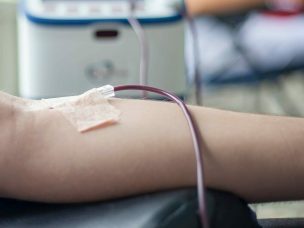Immune checkpoint inhibitors (ICIs) block checkpoint proteins from binding with partner proteins, allowing T cells to kill cancer cells. They are safe and effective in treating multiple cancer types, including relapsed or refractory (R/R) classical Hodgkin lymphoma (cHL).
This study, published in the Journal of Clinical Oncology for the 2022 ASCO Annual Meeting, sought to gather long-term survival data on R/R cHL patients after remission due to ICIs treatment.
The data for this study were gathered from four phase 2 clinical trials. All patients were over 18, had R/R cHL, two or more lines of prior chemotherapy, treatment with ICIs monotherapy, and achieved complete or partial remission. A total of 260 patients were enrolled, with a median age of 32. Of these patients, 184 patients had refractory disease, and 54 received autologous stem cell transplantation or brentuximab vedotin.
Ultimately, it was found that the 3-year progression-free survival (PFS) was 55.1%, with an overall survival (OS) of 89.7%. Patients with complete remission fared significantly better than those with partial remission. Additionally, among those with complete remission, longer treatment duration of greater than 24 months resulted in significantly better PFS and OS.
The researchers concluded that achieving complete remission during ICIs treatment and undergoing a longer treatment duration seem to lead to more favorable survival outcomes for patients with R/R cHL [1].
Source:
[1] Liu, W., Lin, N., Xie, Y., Wang, X., Song, Y., & Zhu, J. (2022, May). Survival outcome of patients with relapsed or refractory classical Hodgkin lymphoma who achieved remission during immune checkpoint inhibitors treatment. 2022 ASCO Annual Meeting, Chicago, IL. https://meetings.asco.org/abstracts-presentations/210106










